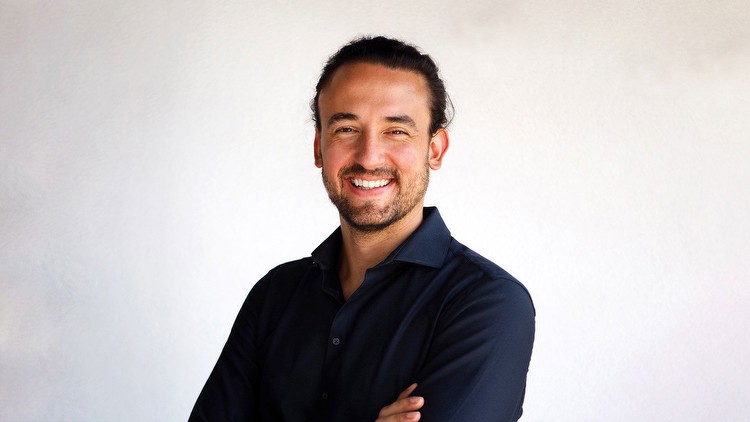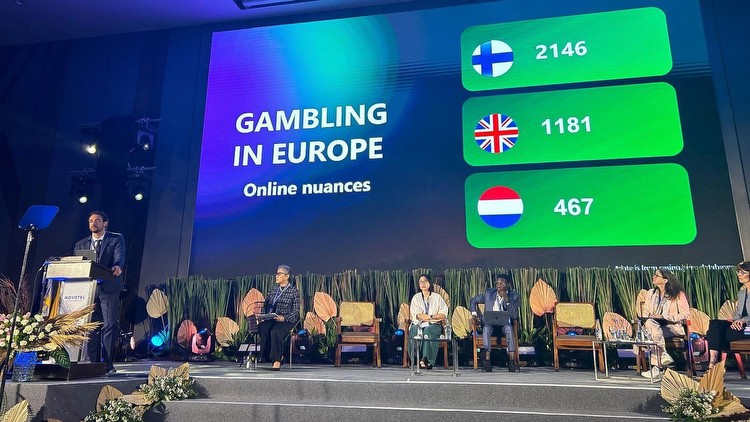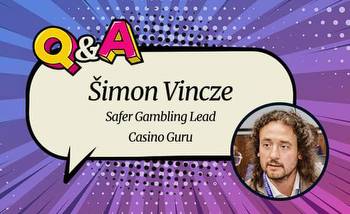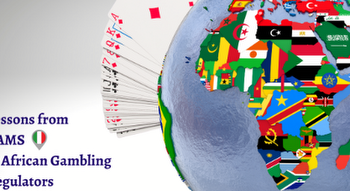"Casino Guru's project on self-exclusion standards aims to unify practice globally, making things easier for players and operators"

From May 20 to 22, the 1st International Conference on Responsible Gambling and Gaming Addiction took place in Quezon City, Philippines. The meeting drew clinicians, psychologists, social workers, policymakers, academics, government officials, and gambling operators, who discussed strategies for promoting responsible gambling practices in the industry.
Simon Vincze, Head of Sustainable & Safer Gambling at Casino Guru, shared his insights on gambling trends, regulation, player protection agenda, fairness in online casino terms and conditions, and the global self-exclusion initiative at the landmark event.
"The unification of (self-exclusion) practice globally can make things easier for players and operators.We have discovered that requirements and practices are diverse across jurisdictions without a sensible reason," Simon Vincze tells Yogonet. "Our project on Self-exclusion Standards aims to change this."
You have recently participated in the 1st International Conference on Responsible Gambling and Gaming Addiction in the Philippines. What are your main takeaways from this conference?
The conference aimed to foster a sense of community and shared responsibility in addressing the challenges of responsible gambling. It brought foreign specialists to the field of addiction and problem gambling while reviewing the local situation and challenges.
It has been often said that Filipinos are natural-born gamblers, with kids betting on spider fights at school and adults engaged in cock-fighting matches, called sabong. Even though online gambling regulation is rather peculiar, locals continue to access it and even bet on e-sabong, live-streamed cockfights. Despite the unique aspects of gambling in the Philippines, the challenges connected with protection are common to other jurisdictions. As the conference showed, we all share the same desire to tackle them.
Sessions from foreign speakers covered topics like the convergence of gambling and gaming, best practices on responsible gambling, cyber wellness, or harm reduction in gambling. I was among the four speakers who brought an overview of gambling in their domestic regions. Participants learned about local regulation, the player protection agenda, and the overall gambling perspectives.
On top of that, I was sharing the vision for our Global Self-exclusion System, including unique data on cross-jurisdiction gambling and statistics from our player complaint handling with tips on how to avoid them.
Speaking of the regional input you shared, what are some of the current trends, regulations, and challenges observed within the European gambling landscape?
Land-based gambling is diverse across European states, with monopolies alongside privatized systems and stricter regimes alongside looser ones. Online is almost uniform across the states, with license regimes for private companies. The trend for responsible gambling is going strongly towards the direction of duty of care, where gambling companies share the responsibility for gambling-related harm and are obliged to prevent it by monitoring and interacting with players. Even though not all countries have adopted it as a regulatory requirement yet, the environment in the region favors sustainable gambling. Most of the changes are still driven by regulation, though.
On the other hand, there are significant differences in the details around responsible and problem gambling across European states. Studies by the European Betting and Gaming Association (EGBA) showed that individual countries have different provisions and procedures for using responsible gambling tools or problem gambling monitoring.
Further, the free movement of goods and services by the European Union creates a unique cross-jurisdiction gambling challenge. Thanks to this principle, some operators licensed by the Malta Gaming Authority accept (or target) players from some European countries, even though online gambling is locally licensed. Malta belongs to one of the countries with the duty of care requirement, but European players are exposed to much less reliable operators operating from offshore. Stricter regulations on gambling experience in some countries are expected to increase their presence.

A frequent way to tackle problem gambling is through self-exclusion initiatives, used by those who have recognized that their gambling is harmful to them. Is the adoption of self-exclusion methods on the rise on a global scale, and how effective is this method?
Self-exclusion is a widespread tool offered by the vast majority of online gambling operators. However, the crucial factor for its function lies within the implementation and the scale of protection. The principle of self-exclusion is to deny access to gambling, which can be very tricky in the online space. One of the significant challenges is that online self-exclusion has mutated, and players are using it for different reasons than problem gambling. Gambling operators know this. As a result, their reactions might be inconsistent and thus put themselves and their players at risk.
It is fair to say that self-exclusion is not a silver bullet for problem gambling, and its main challenge currently lies in the scale of coverage. Many countries have adopted nationwide self-exclusion schemes, which are helping many people, but hundreds of gambling opportunities outside still exist. I can now reasonably say that the appetite for global self-exclusion is small, thanks to the challenges and complexities in play.
On a positive note, the unification of practice globally can make things easier for players and operators. We have discovered that requirements and practices are diverse across jurisdictions without a sensible reason. Our project on Self-exclusion Standards aims to change this. The third phase, consisting of broader consultation, has just started, and we invite all stakeholders in the industry to provide their feedback to produce the best outcomes.
At the conference, you led a workshop focused on fairness in online casino terms and conditions. What are the main deficiencies casinos have in their terms and conditions, and how responsive casinos are when players bring up these issues?
The biggest deficiency I currently see is the inability to consider things from a player's perspective alongside the lack of experience. Unfair terms are more than often the result of that rather than bad intent.
Sometimes, it almost seems like there is a draft for online casino T&Cs somewhere on the internet, and companies just copy it to their site. Operators use Terms & Conditions to protect themselves from bad actors and those who would want to take advantage of them. It is a reasonable thing to do, but unintentionally, they might create a disadvantage for ordinary players, who might get into pitfalls. Our mission is to notify our visitors of such pitfalls and nudge them toward a safer option.
The most frequent category of complaints is, by far, delayed withdrawal/payment. More than 30% of them fall into this category, and almost half are rejected because players stop responding. Most likely, they will receive a payment in the meantime and lose interest in complaining. Either way, the damage is already done. The majority of such complaints are avoidable by reasonable processing times and active communication.
Besides being reasonable, casinos' main driver for responding to a complaint is the reputation of their brand on our website. Our asset is traffic and authority, which is why we are successful with player complaints. Of course, there are some who do not believe engagement in our complaints is their style of working. To be fair, some companies feel like they would break GDPR, which has some ground.

How does Casino Guru integrate the promotion of responsible and fair gambling in its processes and reviews, and what role does the Fair Gambling Codex play here?
Our review process is comprehensive, and it takes roughly 4 hours to update the data. Besides the practical information on games or payment providers, we collect those that significantly influence the safety index.We are actually reading their T&C and looking for any unfair or problematic terms, assessing the estimated revenue, looking at any blacklists or complaints on the internet and more. The Safety Index basically says how the casino is going to treat their players and if they will not make obstructions with withdrawals.
Fair gambling codex can be referred to as a code of conduct when we evaluate specific terms or deal with complaints resolution. It is constantly being updated as we learn and expand our understanding of player journeys. I want to mention that the codex runs both directions and includes a description of the unfair behavior of players as well. Even though it is in the minority, individuals or even groups can be very inventive in taking advantage of online casinos.
What are the main challenges in raising the level of awareness on responsible gambling and access to treatment for gaming addiction? How can these be addressed?
One of the main issues for responsible gambling is that players do not care about it and just want to play. The common approach is to consider it as someone else's problem.Until problems occur. Responsible gambling is mainly about prevention, so the ideal scenario is to become familiar with it before the start of the first bet.
Furthermore, it belongs to the stigmatized category together with problem gambling or gambling addiction. People won't pay attention to it as it is perceived as something shameful, something for the weak ones. The truth is that it could grasp anyone. Depending on their awareness and situation in life.
The exact same thing happens once people’s gambling behaviour is out of control as people are hesitant to proceed with therapy or even talk about it with someone. Accessibility of anonymous help from a social worker can overcome this hesitation.
Unfortunately, the solution for situations like these is much more complex as it would require not only a destigmatization of problem gambling help but also a destigmatization of gambling in general. Gambling is surrounded by a bad reputation, many myths, and a lack of support.
People would gamble in secret to make big money, thinking the games are deliberately set to hook them and would not talk to anyone if struggling. This needs to change. There is no point in curing the symptoms if the root cause is still there.
On the contrary, if gambling is perceived as an entertaining activity with risks, where people pay for the fun of thrill and understand that the house always wins, we would have a much more favorable environment to support those who struggle. The stigma can only be broken by bringing gambling to light. By structured education, appropriate regulation and landscape for support.




































